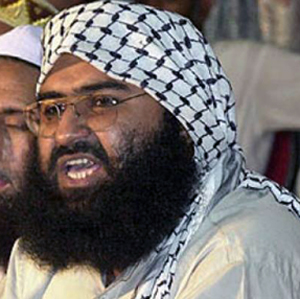New Delhi, Apr 5: India has told the UN that Jaish-e- Mohammed chief Masood Azhar was one of the handlers of the terrorists who attacked the Pathankot airbase and his outfit received arms training from Taliban.
In its failed bid to have Masood designated as terrorist by the UN, India has conveyed to the world body that he and his terrorist group JeM have continuously engineered terror attacks against India, the latest instance being the strike on Pathankot airbase on January 2.
The attack was engineered by terrorists belonging to JeM and credible evidence has emerged that the handlers of the terrorists were senior leaders of JeM, including Masood Azhar, according to the Draft List Entry submitted in the UN.Further, incriminating material has also been recovered from the dead terrorists disclosing their links to the terrorist organisation, it said.
Masood had a meeting with Lashkar-e-Taiba founder Hafiz Saeed and Hizbul Mujahideen chief Syed Salahuddin and decided to "avenge" the hanging of Afzal Guru, who was convicted for the 2001 attack on Parliament.
"A decision was taken in the meeting for possible cooperation with the Taliban to train terrorists for this purpose. There are credible intelligence reports that elements of JeM have actually received training in tactics, use of weapons and psychological warfare from the Taliban," the draft said.
At the behest of Pakistan, China had blocked India's bid to have Azhar designated as terrorist by the UN in the aftermath of the Pathankot strike.
Pushing its case for incorporating Masood's name in the al Qaeda Sanctions List, India has told the UN that Masood is a Pakistan-based international terrorist and a leader of JeM and its chief financier, recruiter and motivator.
The JeM chief has been "participating in the financing, planning, facilitating, preparing or perpetrating of acts or activities by, in conjunction with, under the name of, on behalf of, or in support of supplying, selling or transferring arms and related material to recruiting for and otherwise supporting acts or activities of al Qaeda, Harkat-ul-Mujahidin and JeM", the draft said.
In 1993, Masood first came to the notice of the Indian authorities when he came into contact with leaders of Al-Itihaad Al-Islamiya, an al Qaeda-aligned Somali terror group which had requested money and recruits from Harkat-ul- Mujahidin, a terrorist group based in Pakistan with which Masood was closely associated.
Masood had visited Somalia during that time and facilitated recruitment of Yemeni mercenaries to Somalia.
In 1994, Masood surfaced in Jammu and Kashmir to mediate between various feuding factions of terrorist groups active in the state. He was arrested in February 1994.
However, in 1999, Masood had to be released after his brother Abdul Rauf along with a few others hijacked an Indian Airlines plane and taken to Kandahar in Afghanistan, which was then under the control of Taliban





Comments
Add new comment